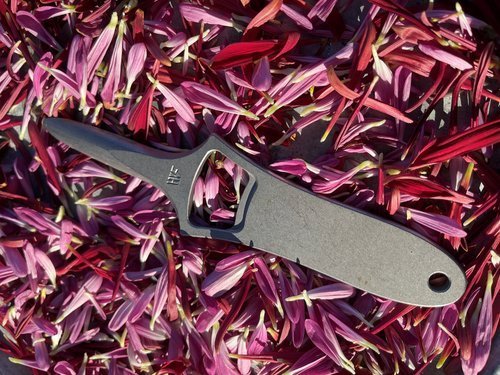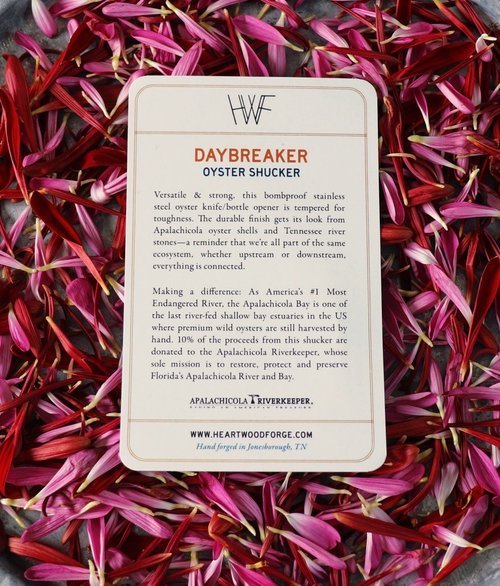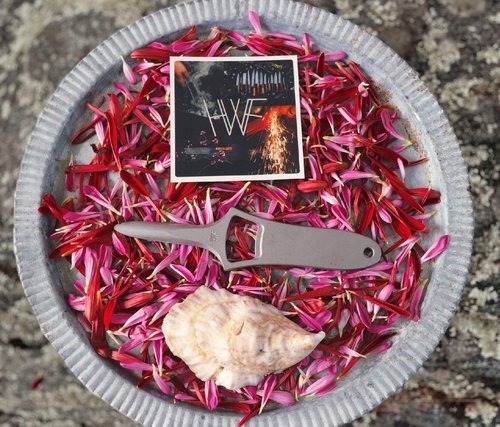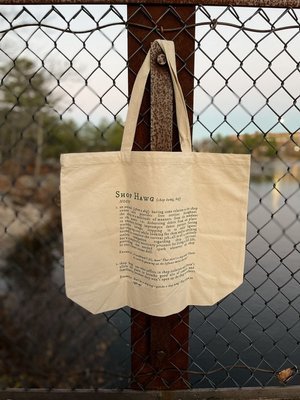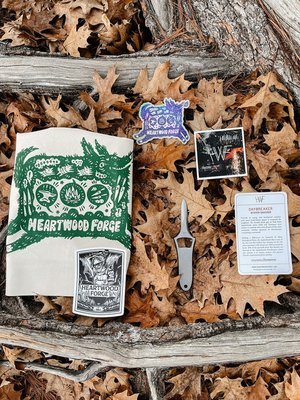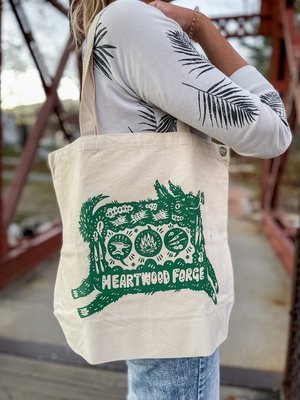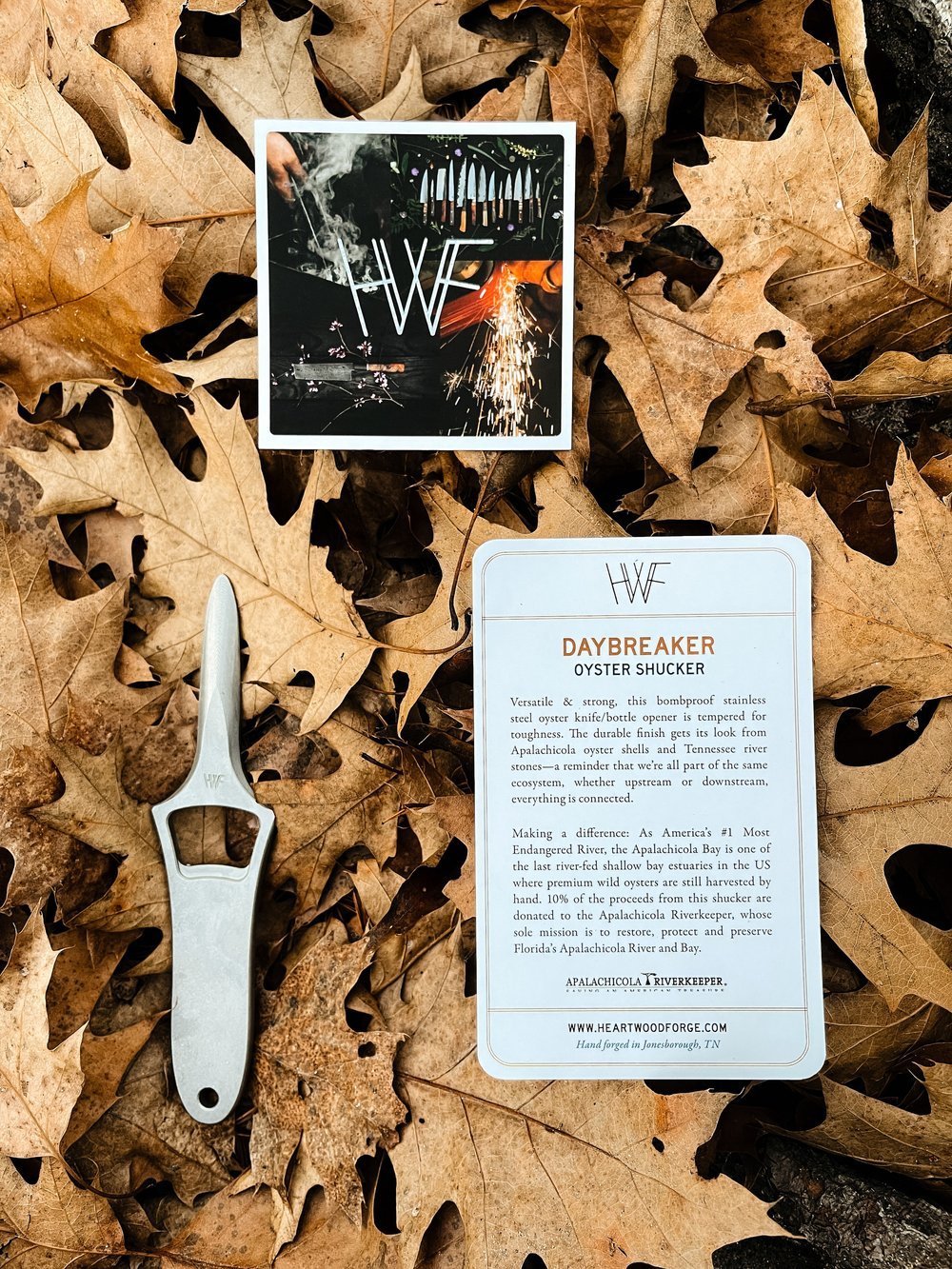The Oyster & The Bladesmith: The Story of Heartwood Forge
Will Manning, the owner of Heartwood Forge, has a deep reverence for the natural world and human history, particularly the intimate link between growing, harvesting, and preparing food. Recently, Will has crafted a new line of premium oyster shuckers that embodies the fusion of his artistic mission, his love of oysters, and his conservationist mantra that "all water is connected."
Based in Jonesborough, Tennessee, a few miles from the great expanse of the Appalachian Trail, bladesmith, Will Manning, breathes new life into retired steel. A true master of his craft, Will has forged knife and blade collections for some of the country's most celebrated chefs, from James Beard winner Chris Hastings of Hot & Hot Fish Club in Birmingham, Alabama to acclaimed barbecue pit-master Charlie McKenna of Lillie's Q, to a custom oyster shucker line for the famous raw bar the Kimball House, in collaboration with the Oyster South community.
But Will's work transcends beyond a list of celebrity clientele. Will, the owner of Heartwood Forge, has a deep reverence for the natural world and human history, particularly the intimate link between growing, harvesting, and preparing food. Each knife he creates pays homage to the interconnectedness between history, culture, personal tradition, and the environment.
But Will's work transcends beyond a list of celebrity clientele. Will, the owner of Heartwood Forge, has a deep reverence for the natural world and human history, particularly the intimate link between growing, harvesting, and preparing food. Each knife he creates pays homage to the interconnectedness between history, culture, personal tradition, and the environment.
Will has made it his practice to source materials for his blades from junkyards that haven't felt hands in centuries.
"I was raised by the blacksmithing community. We would go to local junkyards to find steel and reclaimed metals. Yes, these materials are cheaper, but they also tell a story of the history of a place and the history of a people – how they worked, how they prepared food. These materials tell us so much about the past, and I want to create a link between our history and how we prepare our food."
Recently, Will has undertaken a new project to create a line of premium oyster shuckers that embodies the fusion of Will's artistic mission, his love of oysters, and his conservationist mantra that "all water is connected." A portion of all proceeds from the sale of Will's recently released Daybreaker oyster shuckers are donated to the Apalachicola Riverkeeper, whose sole mission is to restore, protect, and preserve Florida's Apalachicola River and Bay.
***
Will was born in the seaside town of Harpswell, Maine. Although he didn't reside there long, I'm convinced that people born in the state have an innate link to the natural world that they carry with them through their lives.
As a child, Will moved with his family down to Tallahassee, Florida, near the Apalachicola region.
"Growing up in the panhandle of Florida, oysters were a huge part of the culture," Will explained. "People didn't just eat oysters when they went out to restaurants. They brought them home, they shucked them by the bushel, they roasted them, they integrated oysters into their daily meals."
Will's family history was fundamental in forging his path to metal-working. His father crafted Windsor chairs, and raised Will on the reverence for the timeless quality of the hand tools he used. Home-cooked meals were the centerpiece of Will's childhood, and he recounted with nostalgia the smells of his mother's cooking, and the recipes she created with earth-grown ingredients from the family's garden.
Will's foray into the forge happened by chance. Between high school and college, Will played in a local band with his lifelong friends. One day, his bandmate went to a local blacksmith to have a box made for his drumming gear. The blacksmith off-handedly mentioned he was looking for some part-time help around his shop. The message was relayed to Will, who, intrigued by the possibility, went to inquire further. Will spent the next several months apprenticing for the blacksmith.
"The environment was extremely nurturing," Will shared, "there was a local artist who traded weekly work for the use of the blacksmith's tools. It was awesome to see how local artists and artisans came together to work in a collective space."
Inspired by his apprenticeship, Will enrolled in art school to learn more about metalsmithing and forging. His first job out of school was working as a blacksmith at Mission San Luis, a Living History site in Tallahassee. There, Will learned and practiced historical blacksmithing techniques, including forging the actual nails and spikes that went into the construction of his blacksmith shop. The site also featured a large Food Ways program, which focused on both the historical and multi-cultural aspects of gathering and preparing local food.
"That opportunity really ingrained in me the intimate link between tools and the act of preparing food."
During this time, Will also reconnected with his former bandmates, and on one fateful night, he was introduced to his future wife.
"She was super into cooking, so I started making knives and gifting them to her, kind of like a courtship," Will laughed. "Together, we started our own garden, made our own bread, brewed our own beer. It was amazing to work together to create these items we both really loved."
***
After several years together, Will and his wife moved to Athens, Georgia so that his wife could pursue her Master's Degree. In 2014, Will immersed himself in knife-making full-time and turned his 600-foot A-frame home located on a local pond into his first forge.
Will's christened his business Heartwood Forge, a name inspired by the anatomy of a tree. The heartwood is the central, supporting pillar of the tree. Although dead, it will not decay or lose strength while the outer layers of the tree are intact. Heartwood is mechanically strong, and resistant to decay.
"When I started Heartwood Forge, a goal of mine was to mimic the role the heartwood plays in a tree, transitioning materials to their next life, similar to how the change of sapwood into heartwood serves the purpose of added strength for continued growth," Will shared.
Will began using all types of reclaimed and recycled materials in his knife forging, from old saw blades, to 12" master records, to "rejected" scraps of African blackwood from a clarinet factory in Paris. Will's repertoire for rehabilitating and repurposing discarded and broken things is a true gift that caught the attention of members of the local culinary community.
***
While in Georgia, Will crossed paths with Bryan Rackley, co-owner and oyster guru of the Kimball House, the renowned Decatur eatery and raw bar.
"One morning, Bryan showed up at my house with a cooler full of oysters, and said he wanted to get down to business to design a new type of oyster knife," Will reminisced. "Bryan had a French shucker with a thin blade that he really liked to use. We used that as the jumping off point for our prototype designs."
Will crafted the KH-860 oyster shucker, his first ever oyster knife. The knife was a hit – it was featured in Food and Wine magazine as well as Garden and Gun. The creation was massive for Will's professional career, and cemented him as one of the go-to bladesmiths for chefs and the culinary community.
***
After a few years in Georgia, Will and his wife made the move to Jonesborough, Tennessee so that Will's wife could pursue an opportunity with a food incubator program.
"We moved into a beautiful environment near the Appalachian Trail. We had the space to craft our own garden for our food, and I built a full-scale forge near the garden, across from the home," Will explained, "I noticed such an improvement in my work when I had a comfortable space near my home, surrounded by nature."
Once settled in to his new environment, Will began working on a new version of his oyster shucker.
"I wanted to create a shucker out of a reliable, high-quality material that was functional, but not overpriced," Will shared. "And I wanted it to have a bottle opener because so much of my ritual of eating oysters is with a close group of friends sharing a couple of beers and some stories together."
Will began his designs by sketch – how he creates all of his knives. His vision was a unique shape, influenced by his KH-860 shucker, but with a more modified blade. To ensure price-point accessibility and to protect against rusting and damage during the shucking process, Will chose to work with stainless steel.
Will has dubbed his final oyster shucker design the "Daybreaker." Each knife is cryogenically treated to increase their strength. The knife's durable finish gets its look from the tumbling process – these Daybreaker knives are tumbled with Apalachicola oyster shells and Tennessee River stones – "a reminder," Will explained "that we are all part of the same ecosystem, whether upstream or downstream, everything is connected." Will then does all of the final touches on the knives, and tempers each one.
To truly solidify his theme of interconnectedness and to give back to the environment that grows the oysters on which he was raised, a portion of all proceeds from the sale of Will's Daybreaker oyster shuckers are donated to the Apalachicola Riverkeeper, whose sole mission is to restore, protect, and preserve Florida's Apalachicola River and Bay.
***
So what is next for Heartwood Forge? Will has adapted his knife-making and forging on a seasonal schedule in which he crafts a number of pieces and then sells them quarterly through a Newsletter Sale, akin to a kiln sale in the pottery community.
Will has also begun to host immersive knife-making and metalsmithing classes at his home forge. He has hosted some incredible artisans who have gone on to launch successful careers in the metalsmithing world.
Will continues to be a massive supporter of artists and businesses in his community. He has established fundraisers and giveaways for members of the culinary community who were impacted by the COVID-19 pandemic.










